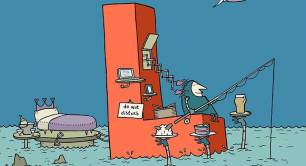Social entrepreneurs open up about failure, mental health and bumps in the road
The pressures of avoiding mental and physical burnout while running a successful social business were laid bare this week – as several founders shared their most personal and challenging experiences before an audience of over 300 people at the UK's major annual event for social entrepreneurs.
Social entrepreneur wellbeing was one of the key themes at Good Deals + Beyond Good Business, hosted in London by Pioneers Post and Hatch Enterprise, with some of the opening speakers candidly sharing the warts-and-all version of their success story.
When Josh Babarinde founded Cracked It, a smartphone repair service staffed by ex-offenders and youth at risk, he had no background in tech repair and no idea how to fix a phone. “YouTube [tutorials] became my best friend, and faking it till I made it for a long time,” he said. There were “humbling moments” when things didn’t go as planned – which occasionally meant taking the phones his team had been unable to fix to other repair shops.
Michelle Morgan (pictured above), founder of “purpose-led pyjama brand” Pjoys and co-founder of youth-led marketing agency Livity, took to the stage wearing pyjamas herself, as a symbol both of being at one’s most comfortable – or, for some of those who are struggling, of days when it’s too hard even to get dressed.
She told the audience about “a really hard year” in 2016, listing a litany of personal and professional pressures – from renovations at home to ongoing physical illness to burnout, “followed by a period of extremely frightening anxiety and depression”. Having been warned that it’s “awkward” to raise the subject of mental health at work, she kept her situation under wraps – an experience that led her to establish Pjoys, which aims to “make mental health an everyday conversation”.
Morgan highlighted the “loneliness of leadership”, and encouraged others to talk more about how they’re feeling, even if leaders can feel like they’re expected to wear a “cloak” or “mask”. She also called on the audience to look out for each other: “If you know a founder or someone scaling up a business, asking them how they’re really feeling is the most important thing.”
If you know a founder or someone scaling up a business, asking them how they’re really feeling is the most important thing
Babarinde echoed this, saying loneliness is “a really, really crippling part of the journey as a social entrepreneur… you’ve got to take all this stuff on your back, and you’ve often got to take it alone”.
He highlighted the support of his peers, including others in his Year Here cohort, and going on what he calls “entrepreneur dates” on a Friday afternoon – hanging out with others to talk through what wasn’t working well.
But he also said that honesty can “help erode feelings of loneliness”. Recounting a “horrendous” time in his personal life last year, Babarinde said at first he was still telling clients, colleagues and partners that things were fine, but that made him feel worse. Being honest about his personal situation “instantly made me feel less lonely”, he said. “I was very surprised at how understanding a lot of those stakeholders were – funders were willing to extend funding periods, our young people understood and were willing to access other services in place of support that we might be able to provide.”
Several other entrepreneurs shared personal experiences on stage.
Paul Talliard recounted his story of overcaming a 15-year drug addiction that “virtually destroyed” his life, to set up Hands of Honour in Cape Town, South Africa, which designs, produces and upcycles furniture while creating employment for marginalised men.
Composer and social entrepreneur Sergio Lopez Figueroa created Humming in Harmony after discovering how much humming helped him through some extremely challenging times in his life, including cancer treatment and a period of homelessness. He is now running a crowdfunding campaign for his humming sessions, which he hopes to share much more widely via the development of a new app.
Thanks for reading our stories. As an entrepreneur yourself, you'll know that producing quality work doesn’t come free. We rely on our subscribers to sustain our journalism – so if you think it's worth having an independent, specialist media platform that covers social enterprise stories, please consider subscribing. You'll also be buying social: Pioneers Post is a social enterprise itself, reinvesting all our profits into helping you do good business, better.


